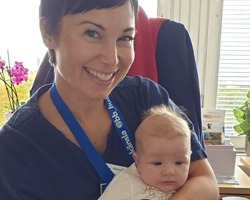Midwives and doulas in Sweden helping reduce cultural and language barriers

Maria Fogelström
“As a midwife you support women throughout their fertile years. I have worked in prenatal, postnatal and delivery care. I am currently part of the Doula och kulturtolk, or Doula and cultural interpreter, project, which was set up to improve the care experience and pregnancy outcomes for migrant women in Sweden,” says Maria Fogelström, a midwife working at the Karolinska University Hospital in Stockholm, Sweden.
“It’s a wonderful project. Migrant women can choose to be supported by a doula – a woman who speaks their native language, is familiar with their culture and is educated in supporting expectant mothers during pregnancy, labour and after giving birth. My primary responsibility as a midwife is to ensure the medical well-being of the birthing mother and the baby. The doula takes direction from me if needed, but she pays attention to the emotional and psychological needs of the women”.
Maria recalls a birth in which her partnership with a doula made a true difference
“The woman giving birth was from northern Africa and didn’t speak Swedish. She was a survivor of female genital mutilation and she had no partner, so she was particularly vulnerable. When I attended the birth, the doula and the woman had already established a relationship and, therefore, a bond. It was wonderful because the labour progressed very well as a result. It’s crucial to feel secure when giving birth. The three of us – women working together in partnership – that was very powerful.
“In a sense, I have always been a midwife – I have always looked at birth as empowering for women. My mother described giving birth as a very positive experience for her, so it’s always been a goal for me as a feminist to be a midwife,” explains Maria, who has been working as a midwife for a decade, since 2009, after earning a bachelor’s degree in nursing and a specialization in midwifery.
“I think that a person’s sexual and reproductive health influences how they feel about themselves and their lives. As a midwife, I strive to support other women and I believe I am making a difference with how I treat women and empower them,” she says.
The doula’s perspective: creating a calm environment for birthing women
The partnership between midwives and doulas improves the birthing experience for migrant women. Rima, who is originally from Syria but has been living in Sweden for more than 20 years, says, “we doulas make the woman feel relaxed and safe. We build a bridge between the woman and the midwife. We interpret everything the midwife says. Midwives and doulas have different roles and work together to create a calm, reassuring environment. We all focus on the woman and her needs.
“Sometimes the mother doesn’t want to let go of my hand and won’t let me leave the room. I feel like a big sister or mother to her. I remember I was once called to a delivery where the birthing woman spoke some Swedish but was too tired to communicate and too scared to follow any instructions. I succeeded in soothing her and calming her down. After just one hour we started doing exercises together and she was able to follow the instructions, which resulted in a successful delivery. What makes me most proud in these moments is knowing that I am helping a person in a time of need.
“Many women are scared when giving birth, as I was myself, so I understand what they are going through. I know how important it is to have the right support system in place, especially when it’s someone who speaks and understands your language. I have always wanted to help and support people, and that wish has only intensified during my work as a doula.”



